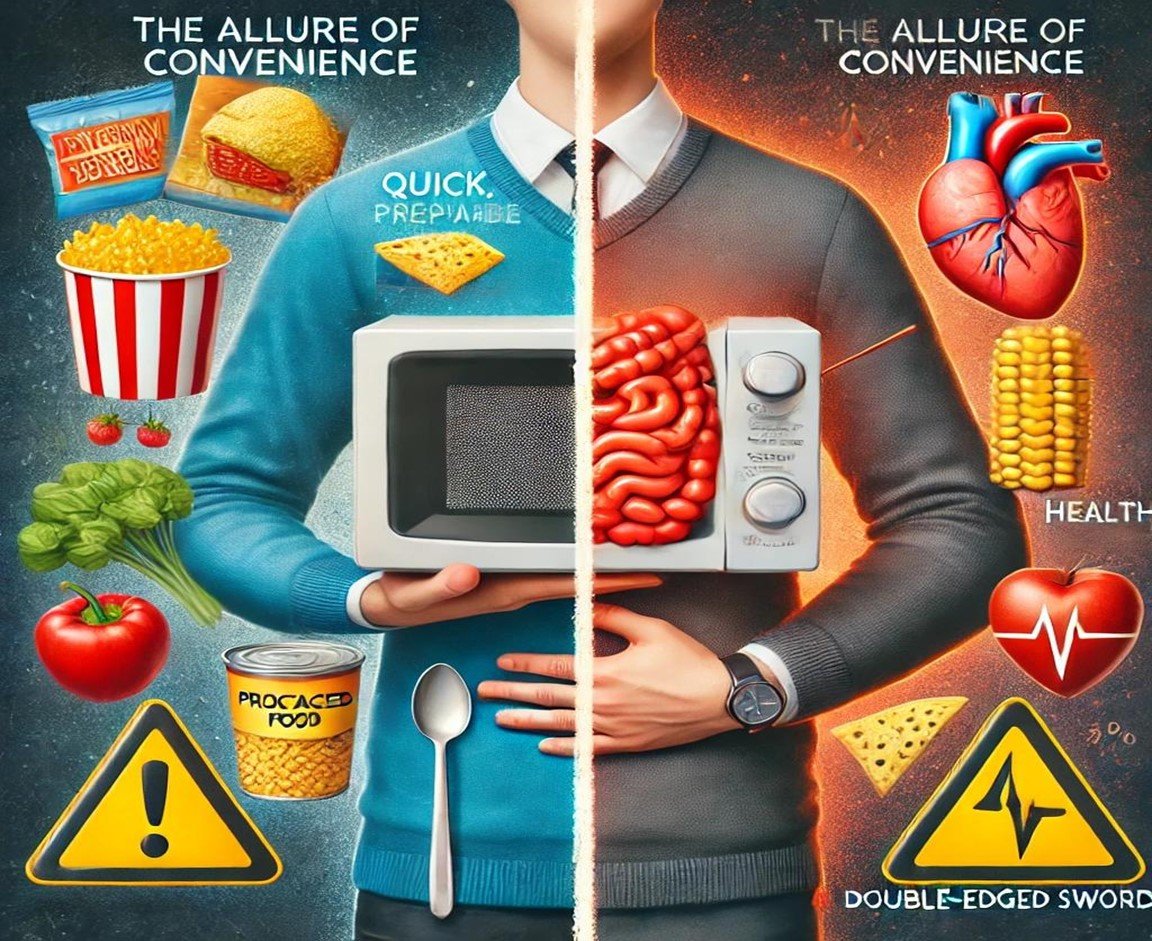
Imagine walking down the grocery aisle, brightly colored packages beckoning with promises of convenience and irresistible flavors. Each package, with its carefully crafted design, seems to whisper assurances of quick meals and satisfying snacks, effortlessly fitting into your busy lifestyle. But what if behind those vibrant wrappers and catchy slogans lurked something far more sinister? What if the very foods that promise to make life easier were slowly eroding your health, one bite at a time?
Processed foods have become so woven into the fabric of our daily lives that we rarely stop to consider their impact. We toss them into our carts, trusting the labels that claim “low-fat,” “sugar-free,” or “fortified with vitamins,” never questioning what lies beneath the surface. Yet, these seemingly innocent staples might be hiding secrets that could compromise your health in ways you never expected. Every time you reach for that quick fix, you might be trading convenience for long-term consequences. The reality is sobering: from heart disease to obesity, the dangers of processed foods are not just myths but real threats that have been linked to some of the most pressing health issues of our time. The convenience of these foods comes at a hidden cost, one that often goes unnoticed until it’s too late. In this blog, we’ll unravel the hidden dangers that lie within these packaged goods and explore the ways in which they could be undermining your well-being. It’s time to look beyond the glossy packaging and ask ourselves: What are we really consuming, and at what price?
The Allure of Convenience: A Double-Edged Sword

We live in a fast-paced world where convenience often trumps all else. The demands of modern life—work, family, social commitments—leave little time for preparing wholesome, home-cooked meals. It’s no surprise that processed foods have skyrocketed in popularity; they’re quick, easy, and sometimes even cheaper than fresh options. With just a few minutes in the microwave or a simple tear of a package, a meal is ready to go, seemingly solving the problem of time constraints. But convenience comes at a cost, and that cost might be your health. These foods, while tempting in their simplicity, are often loaded with added sugars, unhealthy fats, and a cocktail of artificial ingredients designed to enhance flavor and extend shelf life. These additives, while making the food more appealing and durable, can wreak havoc on your body. The sugars can lead to insulin resistance, paving the way for type 2 diabetes, while unhealthy fats clog your arteries, increasing the risk of heart disease. Meanwhile, artificial preservatives and flavor enhancers may contribute to inflammation and other chronic conditions. While it might save you time now, the long-term effects on your health could be devastating, leading to a range of preventable diseases.
Consider the role of trans fats, a common ingredient in many processed snacks, baked goods, and fried foods. These fats, created through a process that makes liquid oils solid at room temperature, have been directly linked to an increased risk of heart disease. Despite efforts to reduce their presence in food, they still lurk in many processed items, hiding under labels like “partially hydrogenated oils.” The more you consume, the greater the strain on your cardiovascular system, potentially leading to life-threatening complications down the line. Processed meats like sausages, hot dogs, and deli meats, while convenient and flavorful, come with their own set of risks. These products are often filled with nitrates, preservatives, and other chemicals to maintain their color and prolong shelf life. However, these additives have been associated with higher cancer risks, particularly colorectal cancer. When we prioritize convenience over nutrition, we inadvertently expose ourselves to these hidden dangers, sacrificing our health for the sake of saving a few minutes in the kitchen.
Even more concerning is the cumulative effect of these choices. It’s not just one meal or one snack; it’s the gradual buildup of harmful substances in your body over time. Each processed meal adds another layer of risk, another step toward chronic illness. As these foods become a regular part of your diet, the balance tips further away from health and toward disease. The convenience that once seemed like a blessing starts to reveal itself as a curse, trapping you in a cycle of poor nutrition and deteriorating health. The convenience of processed foods may solve short-term problems, but the long-term consequences are far more severe. It’s crucial to recognize these hidden dangers and make more informed choices about what we put into our bodies. By opting for whole, unprocessed foods whenever possible, you can break free from the cycle and reclaim your health. After all, your well-being is worth far more than the convenience of a quick meal.
The Science Behind the Taste: Why Processed Foods Are Addictive

Ever wonder why it’s so hard to stop at just one chip or cookie? It’s not just your lack of willpower; it’s science. Processed foods are engineered to be hyper-palatable, meaning they’re designed to hit the perfect balance of salt, sugar, and fat to keep you coming back for more. This carefully calculated combination triggers the brain’s reward system, releasing dopamine and making you crave these foods again and again. It’s a chemical reaction that’s almost impossible to resist, turning a simple snack into a compulsion.
But this addictive quality isn’t just about taste—it’s about profit. Food manufacturers spend millions on research to create products that maximize cravings, leading to overconsumption and, ultimately, health problems like obesity and diabetes. These companies employ teams of food scientists and psychologists to ensure that every bite is as irresistible as possible, knowing that the more you eat, the more you buy. The next time you reach for that second helping of chips, remember that it’s not just your appetite you’re feeding; it’s a multi-billion dollar industry designed to keep you hooked.
This manipulation extends beyond the grocery store aisle, influencing everything from advertising campaigns to product placement in stores. The bright colors, catchy jingles, and strategic positioning on shelves are all part of a calculated effort to make these foods almost impossible to avoid. They’re engineered not just for your taste buds but for your mind, creating a cycle of desire and consumption that’s difficult to break. Understanding this can empower you to make more mindful choices, recognizing that what feels like a personal craving might actually be the result of a carefully orchestrated plan to keep you eating—and spending.
The Nutrient Deception: Empty Calories and Hidden Ingredients
Processed foods might look and taste appealing, but they’re often nutritionally empty. Beneath their vibrant colors and enticing flavors lies a product that has been stripped of its natural goodness during manufacturing. In an attempt to make up for the lost nutrients, these foods are then “fortified” with synthetic vitamins and minerals, cleverly marketed to appear healthier than they truly are. However, these added nutrients are no substitute for the real thing. The body doesn’t absorb them as efficiently as it does nutrients from whole foods, leaving you with a false sense of nourishment. What’s more, these processed options lack the beneficial fiber, antioxidants, and phytochemicals that are essential for overall health, making them little more than empty calories dressed up in attractive packaging. Moreover, processed foods often contain hidden ingredients that can be harmful in large quantities, further compounding the risks they pose to your health. High-fructose corn syrup, a common sweetener found in everything from sodas to cereals, has been linked to insulin resistance and fatty liver disease. Its pervasive presence in the food supply makes it easy to consume more than you realize, silently contributing to the development of chronic conditions over time. Sodium, another frequent additive, is used in large amounts to enhance flavor and preserve shelf life, but its impact on your health can be severe. Excessive sodium intake has been shown to lead to hypertension, increasing the risk of heart attack and stroke.
These “hidden dangers” make processed foods a ticking time bomb for your health. They may offer convenience and taste, but the trade-off is a slow and steady erosion of your well-being. Each bite that seems harmless could be contributing to a host of health issues that may not manifest until it’s too late. By understanding the risks and making more informed choices, you can avoid falling into the trap of relying on these nutritionally deficient foods and instead prioritize whole, unprocessed options that truly nourish your body.
Knowledge Is Power—Choose Wisely
The convenience and taste of processed foods are undeniable, but so are the risks. Being aware of what’s lurking in your favorite snacks and meals is the first step toward making healthier choices. Opt for whole, unprocessed foods whenever possible, and remember that knowledge is your greatest ally in the battle for better health. After all, what you don’t know can hurt you, and in the case of processed foods, it might even be deadly.